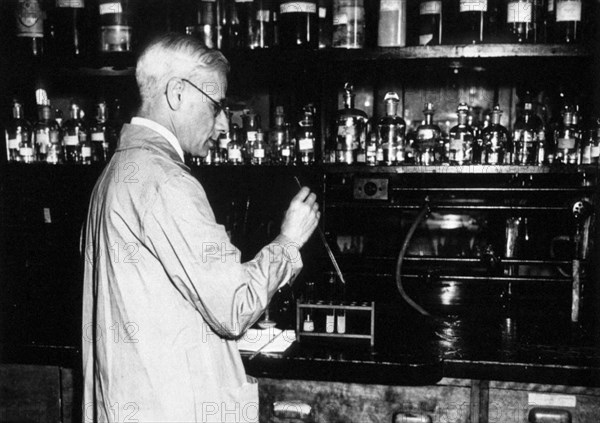Sujet
Michael Heidelberger, American Immunologist
Légende
Heidelberger in laboratory. Michael Heidelberger (1888-1991) was one of the fathers of modern immunology and the founder of immunochemistry, the branch of biochemistry that examines the chemical aspects of immune reactions on a molecular level. By applying the quantitative methods of analytical chemistry to the study of the mammalian immune system, he moved immunology from the imprecise realm of contemporary colloidal chemistry into the exact field of biochemistry, thereby laying a path for a new understanding of infectious diseases, their treatment, and their prevention. During his long scientific career Heidelberger devoted himself to exploring the implications of his path-breaking discovery, made with Oswald T. Avery in 1923, that type-specific antigens of pneumococcus bacteria, the most common cause of pneumonia, are complex polysaccharides. Over the next three decades this discovery enabled him to determine the exact weight and many details of the chemical composition of antibodies, antigens, and complement, proteins that regulate antibody-antigen reactions. He showed that antibodies are proteins and that antibodies and antigens are multivalent, meaning that they have two or more (in the case of antigens, many more) binding sites. He used these findings to develop a simple vaccine against pneumonia whose effectiveness was first proven in World War II soldiers, and which in modified form remains in use today. He published over 350 scientific articles, spread over every decade of the twentieth century. He lived to be 103, and was in the laboratory until a few weeks before his death in 1991.
Info+
Photographe : Photo Researchers
Crédit
Photo12/Alamy/Science History Images
Notre référence
LMY20T04_HRNR0K
Utilisation
uniquement en France
Model release
Non
Property release
Non
Licence
Droits gérés
Format disponible
30.7Mo (1.3Mo) / 33.0cm x 23.3cm / 3900 x 2751 (300dpi)
